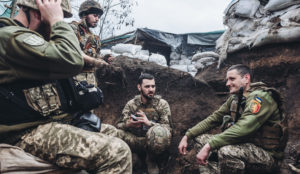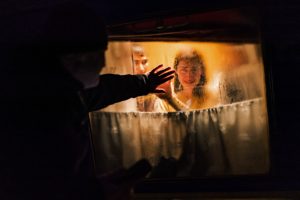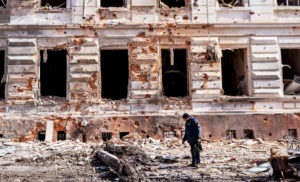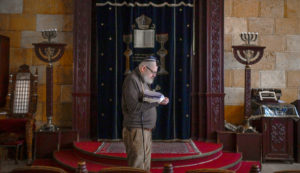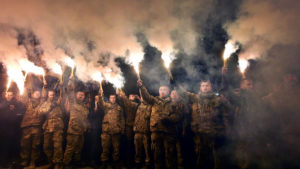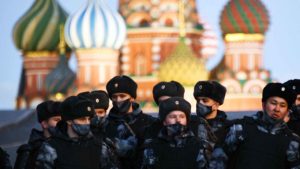The square is an ocean of black and green tents flying yellow and blue flags. Their canvas openings flutter serenely in the breeze amid surroundings of organised chaos. Violence has come to this place. Torn up paving stones lie in piles next to mounds of rubber tyres. Photos of the dead, often garlanded with flowers, stud the walls and embankments; rickety stalls sell a variety of tat to the many foreigners that have descended on the city.
It’s April 2014 and Maidan Nezalezhnosti (Independence Square) contains the remnants of the 2013-14 Euromaidan Revolution. Its inhabitants have lived here in these tents for months, refusing to leave the place that has given them a reason to get up in the morning. The square is now their home: they wash and dress and cook here. The revolution has given them not just a purpose, but like Ukraine, a nascent, and now burgeoning, identity.
Beyond the square, on Kreshchatyk, stands a tall makeshift tower built from scaffolding. Festooned with posters and banners, it is dominated by a large image of the man on everyone’s mind: Vladimir Putin. He has been photoshopped to make him look like Hitler.
Ukraine gained independence from the USSR in 1991, but, in 2014, national identity is still fractured. Some of the Western Ukrainians I meet revere the far-right war leader Stepan Bandera; those from the East generally revile him. Most people I meet speak Russian; some refuse to on principle. Sympathy with Moscow, especially among the elderly, does exist. But two things everyone here can agree on: they do not want to be a part of the Russian state, and, above all, they despise Vladimir Putin.
***
That revolutionary detritus is long-gone from the square. But the city today is the nerve centre of an all-out war with Russia. “Ukrainian Resistance” reads a poster on a wall near McDonalds. A couple of soldiers walk past. A new Europe — and a new century — is being born, and at the centre of it all is Kyiv. This city sits at the heart of Putin’s efforts to recreate a mythical identity of a Greater Russia based on a fraudulent reading of the past.
When Putin went for Ukraine this year, it was Kyiv, the home of ancient Kievan Rus, the “mother of all Russian cities”, that he wanted above all else. The Ukrainians beat him back. But now Russian rockets pound the city once more. Putin cannot let Kyiv go. But neither can the people who live here. Kyiv is not just a city; it is the essence of this conflict, which is one not just about land, but about history and geography and, on a fundamental level, about the identity of both these countries.
***
“My surname is Kozhemiaka and from that alone you know my family are Kyiv natives. There’s a street in Podol [in the city centre] that is called Kozhumiatska — we are originally from there. I have photos of my great grandfather and grandmother there from 1881.”
Angelina sends me six yellowing photos, two of which are of a solemn but kind-looking couple: he with an austere, clipped moustache; she with hair conservatively pinned back. I’ve known her for eight years but it’s the first time I’ve heard about the etymology of her name.
I think back to our first meeting late summer 2014 in Maidan, when I caught sight of her, threading her way through the square’s tents and stalls and crowds. Angelina was running a social media advertising agency (and does stuff with monetising websites that I don’t understand) and I wanted to speak to her about how social media is being used to spread propaganda.
Always stylishly dressed and immaculately made up, Angelina likes nice hotels and foreign travel and has a keen interest in fashion. With her small toy dog (a Spitz called Preston Pit) she perfectly fits the cliché of the apolitical cosmopolitan class. But – like so many people I have met here – Angelina is different. She has been jolted into an awakening of political – and inescapably national —consciousness.
“It started with Euromaidan,” she tells me. “I went there twice. Once before the government started shooting on the protestors, and then after it was all finished. I saw the burned-out wreckage in the streets, and even traces of blood. People had started laying flowers to commemorate the dead.”
Angelina wanted to be what she calls a “witness” — to try to get some sense of what really happened there. “What struck me was a Ukrainian unity I’d never seen before. It was like that Ukrainian archetype that is so popular here Cossack Republic of 1918-1920. I saw that brought alive: the sense of complete freedom but among a mix of different people in the square. It didn’t matter who you were, they were all united by one goal – and that was Ukraine.”
She remembers seeing the destruction and the death on TV. “I was shocked,” she says. “I realised then what it took to be free, to become a nation.”
When Putin ordered his armies into Ukraine on 24 February this year, he was determined that it would under no circumstances ever be allowed to be a functioning nation. The very thought was bogus. So he sent his troops straight for its capital: he knew that in order to destroy the very idea of Ukraine, you must take Kyiv. Forces travelled south to encircle the city, while Special Forces (Spetsnaz) were also reportedly sent to infiltrate Kyiv but were quickly chewed up by the Ukrainians. Attempts to seize the airfields of Antonov and Vasylkiv were also unsuccessful, though troops did almost cause a nuclear incident when they took the town of Chernobyl. As they failed to make tangible military progress Moscow switched tactics: the goal was now to level as much territory as possible.
Ukrainian forces counterattacked and by 25 March they had retaken large swathes of the area surrounding Kyiv, eventually liberating Bucha on 1 April, where they discovered mass graves and evidence of widespread Russian war crimes. The Russian high command said their goal was now to “liberate” the Donbas. Putin’s dream of regime change and “restoring” Kyiv, the “Mother of all Russian Cities”, to his country was, for the moment, over.
But he won’t give up. For as long as Kyiv remains proudly Ukrainian, the Kremlin will never annex Ukraine to Russia. In early June, Russian warplanes strike the city from the Caspian Sea. Moscow says it will strike new targets if the United States starts giving Ukraine longer-range missiles. The Kremlin says Ukrainians are merely confused Russians; that Kyiv is not Ukrainian but simply the source of Greater Russia. And it is determined to bomb and kill them until they remember this fact.
Ukrainians resist. They want to be something else. In Podol, I watch hipsters edit graphics on laptops in coffee bars; they are self-consciously western. Europe, not Russia, is their collective dream. Vadym Halaichuk, a Deputy in the national parliament, agrees: “Culturally, we’ve always been Europe,” he says. “Obviously, Ukraine was part of the Soviet Union for a long time and that has had a tremendous impact on how culture here has developed. But even those 70 plus years did not erase our European identity. So when Ukraine gained independence back in 1991 – or regained it – Ukrainians quickly began to realise how different we are from Russia and from what many Russians stand for.”
He continues. “There was still a lot of Soviet influence in the country and our corrupted communist elites did a lot to support that historical misconception that we are the same people.”
Putin, though, would drag Ukrainians eastwards, and back in time. Until then, he is content to sacrifice them at the altar to his own, mad, dreams.
***
It’s winter, 2014, the war is several months old, and there are parliamentary elections. Angelina has volunteered as an election observer. In the western city of Vinnitsa, she stands in a school and watches people casting their votes, to ensure the process accords with international standards. It isn’t much, but in a country legendary for its almost surreal levels of political corruption it is indicative of the new Ukraine that, though not yet born, many here are trying to midwife into existence.
Eight years later, Solomiia Bobrovska, the former acting governor of the Odesa region and a Rada Deputy, drinks coffee with me in Kyiv and tells me about the difficult birth of this new Ukraine. “We technically got independence in 1991 but for the majority of Ukrainians the nation was born, in fire in 2014, and the process is still continuing today,” she says, leaning across the table at me. Her white T-shirt is emblazoned with the Ukrainian trident (Tryzub) and she wears a blue and yellow wristband on her left arm. Bobrovska was born in December 1989, after the Berlin Wall came down. She has only ever known Ukraine. Now she is its future.
“Finally all Ukrainians understand what war means,” she tells me. “When you have funerals almost every day, when almost everyone has lost someone in their families, be they warriors or children, and how much it hurts.”
It is through this hurt that Ukrainian defiance has been forged. If Putin thought he could terrorise Ukrainians into submission he made a grave miscalculation. “After Bucha, there will never be any compromise with these people,” my friend Kirill tells me later that day. “Let them come and try to take my city again. We are waiting for them — and we all have guns now.”
***
The lady is 200 feet tall. In her right hand she holds a sword and in her left a shield. She stands in the Pechersk neighbourhood in central Kyiv. The Motherland Monument is probably the most famous statue in Ukraine. Throughout a large chunk of 2014 I lived in the city, just off Kreshchatyk. Every morning I would walk through central Kyiv to get breakfast, and there she would be.
I walk past it again more on my way to meet Angelina. We haven’t seen each other for several years but have been in constant communication since the invasion. In that time much has happened.
By mid-April 2022, the Ukrainian army has beaten the Russians back from Kyiv. Greater Russia remains a Putinist fantasy. Instead, something else has emerged that, when we meet for drinks a few weeks later, Angelina wants to tell me about. “This is our war of independence,” she tells me. “Never have we been so united. We all understand what our country is now. We all know that we are Ukrainians. We all know that we will never be Russians. We all want the West not the East.”
What Angelina and I saw in Euromaidan in 2013 and 2014 has only grown since then: the slow-motion birth of a nation. The gradual evolution of a post-Soviet state into the flawed, troubled, but undeniably culturally and politically independent Ukraine that exists today. Self-knowledge is painful. This is a nation that has been forged in the crucible of Putin’s stupid, pointless and bloody war.
This speaks to a larger truth about all conflict — and geopolitics: the Law of Unintended Consequences. Putin has, thus far, achieved almost the exact opposite of everything he intended. He wanted Ukrainians to identify with Moscow, he made them despise it. He wanted to put an end to Ukrainian national feeling, he galvanised it. He wanted to merge Ukraine with Russia; Ukrainians are dying to ensure he can’t. He wanted Ukraine to demilitarise, he made it more militarily capable than ever before. He reveres Orthodox Brotherhood; he pushed the Ukrainian Church to break from Moscow. He wanted to divide Europe, he united it (at least for the moment). He wanted to show the world the might of the Russian army, he exposed it as a paper tiger.
Just before dusk on my last evening in the city I go to my Airbnb overlooking Independence Square. Here in 2013 hundreds of thousands of Ukrainians risked their lives to protest their corrupt leader and in so doing set off a chain of events that brought me to this building today. Kyiv abides in my heart. It is a city of legend for me too, and it is where so many things began; both for Angelina, and for me, and, most importantly of all, for Ukraine.
Disclaimer
Some of the posts we share are controversial and we do not necessarily agree with them in the whole extend. Sometimes we agree with the content or part of it but we do not agree with the narration or language. Nevertheless we find them somehow interesting, valuable and/or informative or we share them, because we strongly believe in freedom of speech, free press and journalism. We strongly encourage you to have a critical approach to all the content, do your own research and analysis to build your own opinion.
We would be glad to have your feedback.
Source: UnHerd Read the original article here: https://unherd.com

